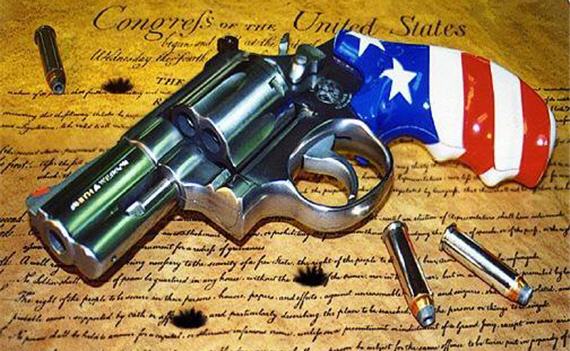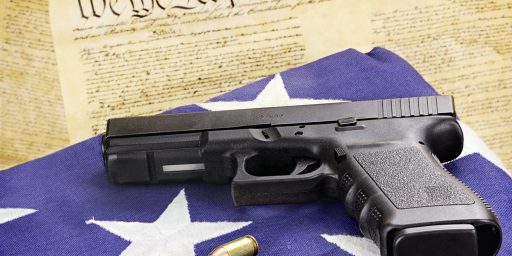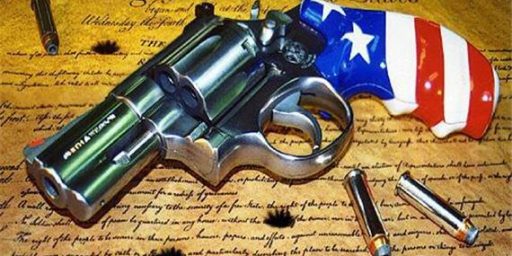Supreme Court Declines To Hear Pivotal 2nd Amendment Case
The Supreme Court has ducked an opportunity to expand the holdings in D.C. v. Heller
The Supreme Court announced today that it would not be accepting an appeal in the case Kachalsky, et al., v. Cacace, et al., a case out of New York that deals with that state’s restrictions on carrying a gun in public:
WASHINGTON (AP) — The Supreme Court is staying out of the gun debate for now.
The justices on Monday declined to hear a challenge to a strict New York law that makes it difficult for residents to get a license to carry a concealed handgun in public.
The court did not comment in turning away an appeal from five state residents and the Second Amendment Foundation. Their lawsuit also drew support from the National Rifle Association and 20 states.
Lyle Denniston is among the Court observers who wasn’t surprised by the move:
The Supreme Court, following a pattern that is now quite well established, chose again on Monday to remain on the sidelines as the national debate over gun ownership heats up in the political realm. Without comment, the Justices denied review of the latest attempt to test whether the Second Amendment right to have a gun extends beyond the home.
The denial of review in Kachalsky, et al., v. Cacace, et al. (docket 12-845) was the latest in a series of denials of attempts to get the Justices to explore the reach of the Court’s 2008 decision in District of Columbia v. Heller, recognizing a Second Amendment right to have a gun for personal self-defense. That decision, though, was limited to a right to have a gun ready to shoot inside one’s own home.
(…)
Because the Court does not explain orders denying review, there is no way to know why the Justices would again choose not to get involved in a controversy that, in essence, the Heller decision itself has deepened. One of the most common reasons for the Justices to grant review is the existence of a split among lower courts on a significant constitutional issue. There is now such a clear split among federal appeals courts on whether constitutional gun rights extend beyond the home, and yet that was not sufficient to draw the Court back into the center of the controversy in the new case from New York. The new case sought to test the constitutionality of limiting a citizen’s right to a license to carry a concealed gun in public to those who can show they have a “proper cause” for their belief that they need a gun for self-defense away from home.
The split exists due to a decision handed down in December by a three-judge panel of the 7th Circuit Court Of Appeals that found Illinois’ ban on allowing gun owners to carry a concealed weapon to be unconstitutional, and giving the state 180 days to repeal the law and set up a scheme to comply with the Court’s decision. There was a development in that case recently as well when the 7th Circuit denied the state’s petition for a reheating in front of the full 7th Circuit.This means that the countdown is still clicking and that Illinois will need to change its concealed carry law by June unless it’s able to obtain a stay of the 7th Circuit’s order. However, although it has not reached their desks yet, the Justices are no doubt aware of the Illinois case and aware of the fact that there is a split among the Circuits on this issue, which makes the Court’s decision not to take this case unusual.
As Denniston has noted, though, the Court has refused to take up appeals in several 2nd Amendment cases over the past several years. This suggests that even the Court’s four conservative Justices are unwilling to let these cases be heard. Perhaps because they can count heads and realize that there isn’t much support on the Court for expanding the holdings in D.C. v. Heller and McDonald v. Chicago beyond their holding that the 2nd Amendment guarantees a right for individuals to possess a weapon for self-defense in their home. Indeed, it’s worth noting that in his majority opinion in Heller, Justice Scalia specifically stated that the Court was not ruling on the applicability of the 2nd Amendment beyond the facts presented in this case and, in dicta, that the history of the Amendment does suggest that some form of regulation is acceptable. This reflects both Scalia’s own position on the issue and the opinion of the 5-4 majority that was able to be cobbled together to support the ruling. It’s entirely plausible that one, or more, members of that coalition may not support extending the 2nd Amendment right recognized by the Court any further than that ruling. On the other side of the bench, the Court’s liberals may be nervous about accepting a case that could potentially vastly expand the ruling in Heller. We’ll never know for sure, but it’s possible that no Justice voted to take the case.
Ilya Somin points out that the Supreme Court won’t be able to avoid the issue forever:
We’ll now have to wait a bit longer for the Court to do that. As is always the case, the Court doesn’t give reasons for granting or denying review, but it’s possible that the Court didn’t want to take a gun case from the Second Circuit, which has jurisdiction over Connecticut, where the Newtown shootings occurred. Or it may be waiting for Moore v. Madigan, because taking a petition brought by a state government would be seen as less discretionary – and would also allow the Court to focus on a complete ban on the right to carry rather than severe restrictions. (D.C. and Illinois are the only jurisdictions that have flat bans, while 10 states, including New York, “may issue” such licenses in practice, but most rarely do in practice except to celebrities and former law enforcement officers. The vast majority of states ”shall issue” carry licenses unless the applicant has a felony conviction or mental illness, while a handful don’t require a license at all.)
In any event, the issue isn’t going away and there’s only so long that the Court will be able to bear the legal incongruity and uncertainty. As former solicitor general Paul Clement – who represented the NRA in McDonald v. Chicago - put it, ”They’re eventually going to have to take it.”
Another possibility is that the Justices, aware of the act that the Illinois case, is most likely headed toward them simply didn’t want to take on another high profile case this term. They’re already dealing with affirmative action and same-sex marriage, taking on a major gun rights case would probably put the Court in the political cross hairs as much as it was during last year’s ObamaCare case, especially in the wake of Newtown and Aurora. If the Court does grant certiorari in Moore v. Madigan, the case likely would not be heard until the Court’s next term simply because there isn’t much room left on the Court’s briefing and hearing schedule, especially for a major case like this,.
But what if the Court really is trying to avoid wading too heavily into the gun debate right now? I’d suggest that this could have major implications for the ongoing gun control debate. Already Connecticut and New York have passed major gun legislation. Maryland isn’t far behind, and neither is Illinois. Unlike in years past, it seems inevitable that these laws will be challenged in the Federal Courts. It’s entirely possible that the Court may end up deciding to leave this matter to the states.




“It’s entirely possible that the Court may end up deciding to leave this matter to the states.”
—————————–
Yeah, assault rifle bans at state level is something Mitt Romney would be for and against.
Perhaps the greatest irony with C&C restrictions is that they entail multiple layers of amazing ironies.
It goes without saying — except perhaps to a brain dead liberal — that criminals obviously don’t comply with C&C restrictions. If anything they get emboldened. That in turn has contributed to high rates of gun violence in big liberal Democrat cities. Law of unintended consequences. In turn that’s resulted in vast numbers of gun crime enhancements to criminal prosecutions. Meaning longer sentences. Thereby entailing more prison-related public resources. Then the Feds also have gotten in on the act, handling vast numbers of gun/gang prosecutions. Resulting in federal public money also being used to put away in large part racial minorities for longer periods of time than if guns had not been involved with the underlying crimes.
So the question needs to be asked: Are liberals proud that their pet anti-gun laws are being used at various levels of the legal systems to lock up for decades inner city blacks, Asians and Latinos, who disproportionately are being prosecuted under gun-enhanced criminal laws and then disproportionately are being sent up the river to rot, under gun-enhanced sentencing laws and guidelines?
Of course there’s one final irony with all this. How many trust fund liberals in the media and on the Internet ever have occasion to walk through at Midnight the likes of South Central Los Angeles or the Tenderloin District of San Francisco? Not too many, obviously. But if they did? They’d wish to pack a gun. Guaranteed. They’re not that dumb.
I think that in the light of the proliferation of concealed carry and “stand your ground” laws, some on the Court want to take a step back and not want to encourage any further movement toward an armed society. Its one thing to be in favor of a man having a gun in his house for self-protection: its a whole nothing thing to have people going around being vigilantes and carrying guns into malls, bars and churches. I think that if the present Court takes any case, it will be looking to limit, not expand, the reach of Heller. Also too, Newton.
Of course criminals, by definition, don’t obey laws of all sorts…so by your logic we should toss out all laws.
You stupid mother-f’er…how do you even get thru the day with an IQ in the double-digits????
In Chicago and Houston the populations are essentially the same: 2.7 million for Chicago, 2.15 million for Houston. Median household income is $38,600 in Chicago, $37,000 in Houston. Racial makeup? Blacks make up 40% of the Chicago population and 24% in Houston. Hispanics were 30% in Chicago, 44% in Houston. Whites make up 38.7% of the Chicago population, 26% of Houston’s.
Here, though, is where it gets interesting.
In Chicago you cannot get a permit to carry a concealed weapon. In Houston you can. There are no gun stores in Chicago. In Houston there are 84 dedicated gun stores, and 1,500 other legal places to buy a gun (WalMart, BassPro, etc).
There were 806 murders (28.4 per 100,000 people) in Chicago in 2012, and 207 (207 per 100,000) in Houston.
The average high temperature in January in Chicago is 28.4 degrees; in Houston its 63 degrees. The conclusion is obvious: Cold weather causes murders.
@C. Clavin: We can disagree here without resorting to foul language and hateful tones.
Jack, you do realize that since you have such a ridiculous excess of guns in the US, guns can illegally cross state lines? How will placing guns in family households improve the murder and/or gun death situation in Chicago?
Also, how many of the murders in Chicago involve non-criminals? Gang members are going to keep killing one another no matter how many of your fetishist murder tools are spread across family apartments in Chicago.
@Commonist: Here are some ideas to break the gangs. Use racketeering laws – these give police a lot of power and leeway. Have a nationwide gang registry, similar to the highly effective sex offender registry. Once a person is convicted of any crime that is tied in any ways to gang activities they have to register. Post signs in front of their residence: “Herein resides a measly coward: (name): gang member”. Shine bright lights on their house all night, neighborhood watch groups can follow them around, and police should shake them down a few times a day. Soon they will leave town like rats scurrying in the light.
“There were 806 murders (28.4 per 100,000 people) in Chicago in 2012, and 207 (207 per 100,000) in Houston.”
NYC has half the homicide rate of Houston and no guns allowed. New Orleans has a homicide rate about 3 times that of Chicago and you can buy guns there. Must be the crawfish.
http://www.redeyechicago.com/news/redeye-homicide-rates-of-large-us-cities-20120724,0,1457967.photogallery
Steve
@Commonist: Obviously the ban on weapons in Chicago isn’t doing very well. Like you said the criminals will get them so why take them away from law abiding citizens. You’re making my point here. NY wants to blam out of state guns for their crime yet surrounding states that allow guns don’t have the same murder rate with guns that NY has.
@steve:
That’s the thing that drives me nuts. There’s a lot of shit southern cities with absurd crime rates out there. Miami, Memphis, Little Rock, New Orleans. Can we stop pretending like southern states with lax gun laws are bastions of public order.
Sorry, but I didn’t point out anything here. You are confusing me with someone else, probably Ilya Shapiro of the Cato Institute.
@Tyrell: The sex offender registry is NOT highly successful. It’s a sham used to forever condemn people with a scarlet letter. Most of the people on the lists these days aren’t even dangerous.